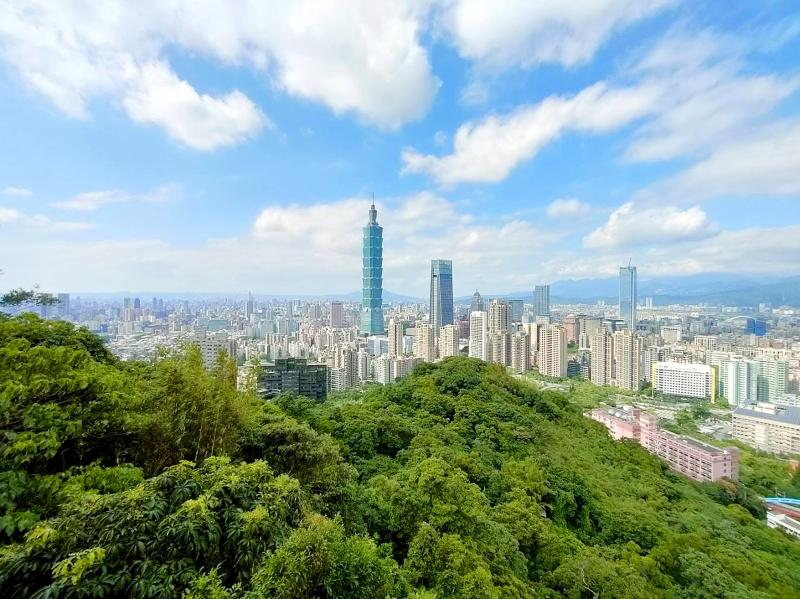Land transactions by listed firms totaled NT$49.1 billion (US$1.65 billion) in the first half of this year, falling 27 percent from a year earlier, as companies turned cautious about investing in land, Sinyi Global Realty Co (信義全球) said yesterday.
Despite the slump in transaction value, the number of deals climbed from 53 to 56, as players grew more financially astute about where to put their money amid increasingly unfavorable lending terms, said Sinyi Global, the commercial property arm of Sinyi Realty Inc (信義房屋).
Soaring land and labor prices have prompted property developers to slow the pace of acquiring land, Sinyi Global said, adding that land financing restrictions and interest rate hikes also weighed on purchases.

Photo: Hsu Yi-ping, Taipei Times
Property developers remained the largest players, accounting for 71.9 percent of the transactions in the first six months of the year, with Taipei, New Taipei City and Kaohsiung making up 50 percent of the deals, it said.
Technology firms also joined the fray, contributing NT$5.4 billion, led by chip designer Mediatek Inc (聯發科), which won the superfices right to a plot of land at the high-speed rail station in Hsinchu for NT$3.77 billion, it said.
By area, Taoyuan topped the ranking at 36,000 ping (119,008m2), followed by Hsinchu County’s 22,000 ping and Tainan’s 14,000 ping, it said.
About 90 percent of the land deals fell outside Greater Taipei, where large and idle land is hard to find, especially in popular locations, it said.
Sinyi Global said it expects the cautious sentiment to persist next quarter, as developers would hesitate to add to their land inventory unless they are confident about sales.
Property funds are likely to continue to flow to central and southern Taiwan, where the cost of land is more affordable, it said.
Builders are also shifting their focus to the development of office buildings, which have robust demand, it said.

TRADE WAR: Tariffs should also apply to any goods that pass through the new Beijing-funded port in Chancay, Peru, an adviser to US president-elect Donald Trump said A veteran adviser to US president-elect Donald Trump is proposing that the 60 percent tariffs that Trump vowed to impose on Chinese goods also apply to goods from any country that pass through a new port that Beijing has built in Peru. The duties should apply to goods from China or countries in South America that pass through the new deep-water port Chancay, a town 60km north of Lima, said Mauricio Claver-Carone, an adviser to the Trump transition team who served as senior director for the western hemisphere on the White House National Security Council in his first administration. “Any product going

STRUGGLING BUSINESS: South Korea’s biggest company and semiconductor manufacturer’s buyback fuels concerns that it could be missing out on the AI boom Samsung Electronics Co plans to buy back about 10 trillion won (US$7.2 billion) of its own stock over the next year, putting in motion one of the larger shareholder return programs in its history. South Korea’s biggest company would repurchase the stock in stages over the coming 12 months, it said in a regulatory filing on Friday. As a first step, it would buy back about 3 trillion won of paper starting today up until February next year, all of which it would cancel. The board would deliberate on how best to effect the remaining 7 trillion won of buybacks. The move

China’s Huawei Technologies Co (華為) plans to start mass-producing its most advanced artificial intelligence (AI) chip in the first quarter of next year, even as it struggles to make enough chips due to US restrictions, two people familiar with the matter said. The telecoms conglomerate has sent samples of the Ascend 910C — its newest chip, meant to rival those made by US chipmaker Nvidia Corp — to some technology firms and started taking orders, the sources told Reuters. The 910C is being made by top Chinese contract chipmaker Semiconductor Manufacturing International Corp (SMIC, 中芯) on its N+2 process, but a lack

NVIDIA PLATFORM: Hon Hai’s Mexican facility is to begin production early next year and a Taiwan site is to enter production next month, Nvidia wrote on its blog Hon Hai Precision Industry Co (鴻海精密), the world’s biggest electronics manufacturer, yesterday said it is expanding production capacity of artificial intelligence (AI) servers based on Nvidia Corp’s Blackwell chips in Taiwan, the US and Mexico to cope with rising demand. Hon Hai’s new AI-enabled factories are to use Nvidia’s Omnivores platform to create 3D digital twins to plan and simulate automated production lines at a factory in Hsinchu, the company said in a statement. Nvidia’s Omnivores platform is for developing industrial AI simulation applications and helps bring facilities online faster. Hon Hai’s Mexican facility is to begin production early next year and the